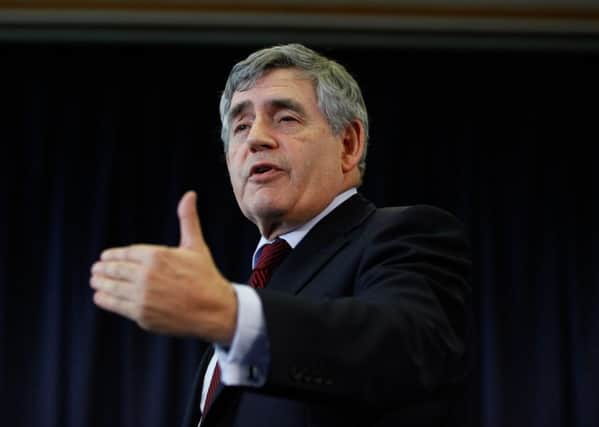Gordon Brown: English nationalism jeopardising UK


The ex-Labour leader also branded Scottish nationalism a “19th-century concept” and suggested Scots will turn away from this and opt for a more inter-dependent approach to politics.
He was addressing a sell-out crowd at the Edinburgh International Book festival today for an event entitled A Conversation About Scotland. The recent UK election saw the “tap of English nationalism” turned on by the Tories at Westminster.
Advertisement
Hide AdAdvertisement
Hide Ad“All this was designed to get the idea that there was a Scottish menace, a Scottish danger, a Scottish risk - it was I’m afraid playing the nationalist card,” he said.
As well as this, the creation of English votes for English laws - creating second class MPs at Westminster - and the “refusal” to grant Holyrood more powers to top up welfare was also cited by Mr Brown as a factor in fostering discontent between Scotland and the UK.
The former Prime Minister added: “The tragedy of all these three changes, which have been brought about in the last year by decisions of the Government of the day, is that they’re pushing Scotland and England further apart.
“So even if the Scottish people decided that they were happy to have a balanced relationship with the United Kingdom, there is this new dimension which will come along again I’m afraid in the European referendum when UKIP has a major role in talking about immigration and everything else and this I’m afraid is driving us apart.
“In the next 12 months I believe the fate of the union will be determined not so much by what we’re saying here in Scotland, but by many of these developments in England which I think are dangerous and in some cases insidious.”
The ex-Prime Minister was widely viewed to have played a crucial role in swinging the indepence referendum result in favour of a No vote with a dramatic intervention in the final few days, including the “Vow” which guaranteed sweeping new powers for Holyrood.
But he suggested that the SNP was happy to “whip up” English nationalism.
“They want to whip up a reaction in England because they want English to say: ‘It’s time to finish the union’.”
Advertisement
Hide AdAdvertisement
Hide AdHe added: “The question then is, is this English reaction being manipulated by UKIP and perhaps by some of the Conservative party? Or is it something, as in Scotland?
“I think that can abate if we have a decent forum of discussion about the right way forward.”
Mr Brown repeated his calls for a constitutional convention which would take in the views of bodies like local authorities and churches on the “great issues” including reform of political institutions including the House of Lords.
He added: “That’s why I would urge today that we find a common ground.”
And the rise of the SNP since the referendum could abate over time, he added, citing the example of Quebec which saw 49 per cent of voters back independence from Canada in the 90s, but support for separation now standing at about half that.
But he warned the country stands at a crossroads and the “uncertainty and insecurity” from an ever changing world is causing people to back ideas like nationalism, at a time when greater global co-operation is needed.
“We could choose a 19th-century model which is absolute sovereignty or we could choose a model of shared sovereignty and recognise that interdependency is the basis of the new economy of the world,” he said.
Mr Brown suggested most Scots would choose the latter, adding that if voters had been offered a “third option” of devo-max in last year’s referendum, then support for Yes would have been “less supported.”
He also rejected the case for “full fiscal autonomy” for Scotland, warning it would mean an end to the “sharing” of resources with the rest of the UK.